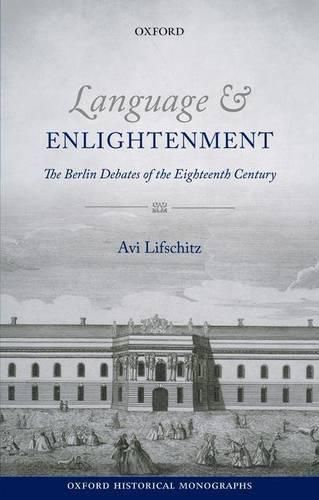Readings Newsletter
Become a Readings Member to make your shopping experience even easier.
Sign in or sign up for free!
You’re not far away from qualifying for FREE standard shipping within Australia
You’ve qualified for FREE standard shipping within Australia
The cart is loading…






What is the role of language in human cognition? Could we attain self-consciousness and construct our civilization without language? Such were the questions at the basis of eighteenth-century debates on the joint evolution of language, mind, and culture. Language and Enlightenment highlights the importance of language in the social theory, epistemology, and aesthetics of the Enlightenment. While focusing on the Berlin Academy under Frederick the Great, Avi Lifschitz situates the Berlin debates within a larger temporal and geographical framework. He argues that awareness of the historicity and linguistic rootedness of all forms of life was a mainstream Enlightenment notion rather than a feature of the so-called ‘Counter-Enlightenment’. Enlightenment authors of different persuasions investigated whether speechless human beings could have developed their language and society on their own. Such inquiries usually pondered the difficult shift from natural signs like cries and gestures to the artificial, articulate words of human language. This transition from nature to artifice was mirrored in other domains of inquiry, such as the origins of social relations, inequality, the arts, and the sciences. By examining a wide variety of authors - Leibniz, Wolff, Condillac, Rousseau, Michaelis, and Herder, among others - Language and Enlightenment emphasises the open and malleable character of the eighteenth-century Republic of Letters. The language debates demonstrate that German theories of culture and language were not merely a rejection of French ideas. New notions of the genius of language and its role in cognition were constructed through a complex interaction with cross-European currents, especially via the prize contests at the Berlin Academy.
$9.00 standard shipping within Australia
FREE standard shipping within Australia for orders over $100.00
Express & International shipping calculated at checkout
What is the role of language in human cognition? Could we attain self-consciousness and construct our civilization without language? Such were the questions at the basis of eighteenth-century debates on the joint evolution of language, mind, and culture. Language and Enlightenment highlights the importance of language in the social theory, epistemology, and aesthetics of the Enlightenment. While focusing on the Berlin Academy under Frederick the Great, Avi Lifschitz situates the Berlin debates within a larger temporal and geographical framework. He argues that awareness of the historicity and linguistic rootedness of all forms of life was a mainstream Enlightenment notion rather than a feature of the so-called ‘Counter-Enlightenment’. Enlightenment authors of different persuasions investigated whether speechless human beings could have developed their language and society on their own. Such inquiries usually pondered the difficult shift from natural signs like cries and gestures to the artificial, articulate words of human language. This transition from nature to artifice was mirrored in other domains of inquiry, such as the origins of social relations, inequality, the arts, and the sciences. By examining a wide variety of authors - Leibniz, Wolff, Condillac, Rousseau, Michaelis, and Herder, among others - Language and Enlightenment emphasises the open and malleable character of the eighteenth-century Republic of Letters. The language debates demonstrate that German theories of culture and language were not merely a rejection of French ideas. New notions of the genius of language and its role in cognition were constructed through a complex interaction with cross-European currents, especially via the prize contests at the Berlin Academy.